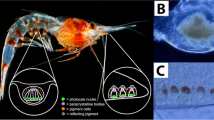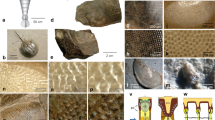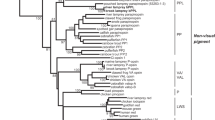Abstract
WE have obtained reliably reproducible measurements of the electric potentials developed in the eyes of euphausiid crustaceans during stimulation by light. Such measurements may provide an objective method for the laboratory study of vision and photoregulated behaviour in planktonic forms which undergo vertical migrations too extensive to be duplicated experimentally with any available equipment. Preliminary observations of two species from the San Diego Trough off California, and one from Loch Fyne in Scotland, are presented here.
This is a preview of subscription content, access via your institution
Access options
Subscribe to this journal
Receive 51 print issues and online access
$199.00 per year
only $3.90 per issue
Buy this article
- Purchase on Springer Link
- Instant access to full article PDF
Prices may be subject to local taxes which are calculated during checkout
Similar content being viewed by others
References
Kampa, E. M., Nature, 175, 996 (1955).
Author information
Authors and Affiliations
Rights and permissions
About this article
Cite this article
KAMPA, E., BODEN, B. & ABBOTT, B. Electrical Response to Illumination of the Euphausiid Crustacean Eye. Nature 183, 1820–1821 (1959). https://doi.org/10.1038/1831820a0
Issue Date:
DOI: https://doi.org/10.1038/1831820a0
Comments
By submitting a comment you agree to abide by our Terms and Community Guidelines. If you find something abusive or that does not comply with our terms or guidelines please flag it as inappropriate.



